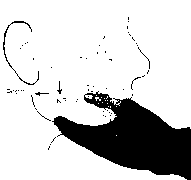Reduction of Mandibular dislocation
Common Bed Side Procedure No. 6
Section Editor: Prof. T.K. Partha Sarathy
Mandibular dislocation (temporo mandibular joint dislocation) happens when a person yawns with his mouth wide opened. He suddenly grips his jaw due to pain and is unable to close his mouth. The dislocation can be unilateral, but is frequently bilateral.
When it happens for the first time, the patient complains of pain and seems embarrassed and distressed. The mouth is partially opened and the chin is protruding and there is bilateral small hollow in the area of the glenoid fossae in front of the ears. Some salivation may be there. Rarely jaw dislocations can happen during eating particularly while taking big bites and even when laughing and speaking loudly. At times during medical procedures like endotracheal intubation and upper GI endoscopies mandibular dislocations can take place. Patients involved in facial trauma can have mandibular dislocation in addition to fractures of the condyle and other areas of the mandible.
Diagnosis
The history and the sudden onset of pain, inability to freely move the jaw and the partially opened mouth; fairly well points out this simple condition.
Unless, one is concerned about possible associated fracture, no x-ray confirmation is necessary before reduction in every situation, thereby avoiding unnecessary delay. But x-ray is necessary where dislocations are suspected following injuries and if there are signs and symptoms of fractures.
Procedure
 |
• Patient is seated comfortably in a chair and is reassured. • The procedure and its simplicity is explained to the patient to seek his full cooperation. •In a tensed up anxious patient mild sedation may be necessary. • The physician uses both gloved hands with the thumb wrapped in gauze piece. • The thumbs placed into oral cavity and rest them over the last molars or over the alveolar ridge if the patient is edentulous. |
|
• Gentle sustained pressure is exerted downwards and posteriorly pushing the mandible backwards into the condyles back over the articular eminence into the glenoid sockets establishing normalcy. • The procedure takes only a, few seconds, particularly when the patients cooperation is there. • General anesthesia will be rarely required if a patient is unable to relax the muscles. • Some physicians inject local xylocaine/novocaine into the glenoid fossa about 2 cc on each side. Without further manipulation the condyle will slide back into the cavities. But this may not be required in all cases. | |
Post procedure instructions:
• Although patient can move the mandible freely, if there is any local bony tenderness and suspicion of fracture a post reduction x-ray may be of value.
• Patient must be warned not to open the mouth wide and over extend the joints. Selective exercise therapy can be of benefit in recurrent dislocations and to avoid recurrence.





Comments
I'm a 23 year old male,it was only today that I came to know about my paraphimosis. It happened because of my own mistakes,at that time I my foreskin was swollen badly,there was pain. But I didn't tell parents or consulted a doctor because I was ashamed of myself. I know it was a wrong choice. However after 15 days pain was gone,and everything was normal except that my foreskin wont come back on its usual place,and it was stuck behind the glan forming oedema. It's been 6 years, I can do all the normal thing. But my oedema is still there. I want to know if it can cause any problem in future?
what can i do as a nurse when the female urethral meatus during cathetherization is invisible.
posted by shadrack kipkorir , from kenya
what are the problems associated with catheterization
I have undergone dorsal slit operation 20 days ago,now the swollen in completely cured however the cut on the foreskin has not healed till now, pls suggest how long will it take to completely heal so that i can go for regular intercourse.RAHUL.
I would like ask about this. I have pain in left mandibular if I open my mouth so I just open my mouth not normal. This condition has happened for 2 weeks. what should I do?
thank you..:0